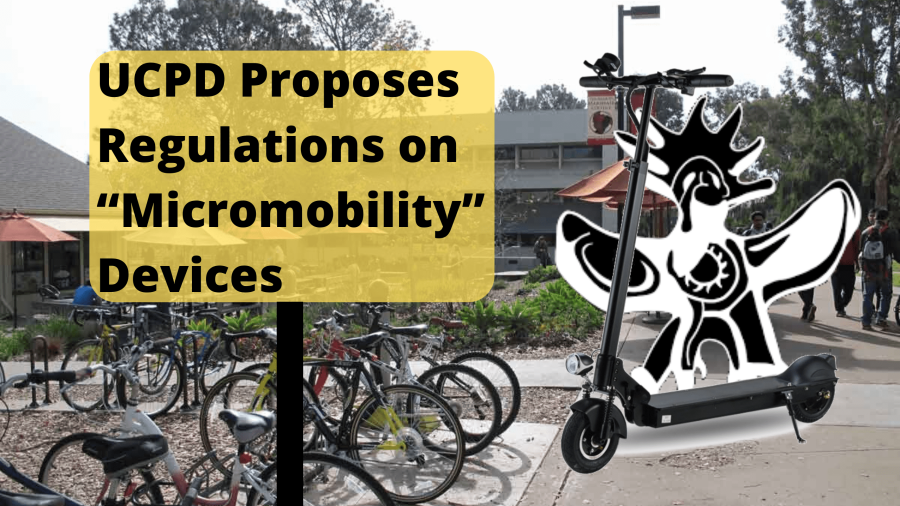The UC San Diego Police Department announced a proposed policy that aims to change the way students get around campus on Nov. 5, 2019. Known as the “Micromobility Device Policy,” the proposed rules target “devices or vehicles […] intended or used for human transport,” which include bicycles, electric and manual scooters, skateboards, roller skates, and any other wheeled vehicle that would fit the parameters listed in the policy.
Bicycles and similar methods of transportation have long been regulated on the UCSD campus in an attempt to ensure safety for all pedestrians and vehicle operators and to minimize the risk of accidents. However, current policy enforced by the UCPD is brief in that it only states when and where it is acceptable to operate such micromobility devices.
This new policy, sent campus-wide on Nov. 5, is more detailed and ambitious in its goals than its predecessors: PPM270-3 Regulations (concerning Bicycles) and PPM270-2 Regulations (concerning Skateboards) — both of which were issued over 20 years ago on Dec.1, 1997. If passed, the “Micromobility Device Policy” would become the new standard on campus.
One of the hallmarks of the proposed policy is the prohibition of the use of cell phones and similar devices. It also prohibits the use of any devices or tools that would inhibit any of the operators’ senses, as university officials believe such devices make it harder for riders to notice pedestrians and hazards, potentially resulting in an accident.
The policy goes into further detail, stating, “Operators of micromobility devices may not wear a headset covering, earplugs in, or earphones covering, resting on, or inserted in, both ears while operating the device.”
This would affect students who like to listen to music throughout their on-campus commutes like Blythe Rinehart-Pimentel, a sophmore Thurgood Marshall College student who rides her bike to get around campus. While she’s willing to cooperate with the rules, she believes that this policy may not be enough to ensure campus-wide safety.
“I also think that there are a lot of other ways to make campus mobility safer including limiting pedestrian use of cell phones, [building] wider roads and pathways to accommodate more people, limiting hours or routes of certain larger carts, and enforcing the speed limit for bikes and other micromobility devices,” Rinehart-Pimentel said.
She also considered the difficulty of enforcing this policy as she believes it is hard to force people to be mindful of their surroundings.
For example, students continue to ride their bikes and skate through Library Walk and other parts of campus, despite the fact that current policy prohibits it between the hours of 8 a.m. and 5 p.m. Using that logic, Rinehart-Pimentel believes there’s no guarantee that people will adhere to a new policy.
“Just like any other rule for bikes on campus, however, many people will not follow it,” Rinehart-Pimentel said.
Another rule introduced in the new policy states that micromobility vehicles “must use lights and reflectors when operating between sunset and sunrise, if such use would be required for operation on roadways under the California Vehicle Code.”
Skateboard enthusiasts Logan Dela Cruz and Alston Wong, seniors from John Muir College and Roger Revelle College respectively, believe skateboards are a different type of micromobility device, noting that some of the proposed policy notes may not seem appropriate for skateboards.
“Skaters don’t go that fast in the dark,” Wong said, who believes that the rule doesn’t necessarily apply to skateboard operators. “They need to see the terrain well for them to go fast so pedestrians would be safe from skaters anyway, in the dark.”
It is important to note that while regular skateboards may be exempt from this rule, users of electric skateboards may have to comply with this policy as the California Vehicle Code requires that electric skateboards be fitted with lights and reflectors.
“I feel like [this rule is] necessary for bikes and scooters,” Dela Cruz said. “It’s hard to see after sunset as a biker and I can only imagine how much harder it is to see a bike or scooter without lights or reflectors.”
The UCSD Administration is encouraging students to voice their thoughts on the proposed policy, which can be read in its entirety at http://adminrecords.ucsd.edu/PPM/DraftMicromobilityPolicy.pdf. Questions and comments regarding this policy may be directed to Paula Johnson in Policy and Records Administration at [email protected] no later than Nov. 30, 2019.














